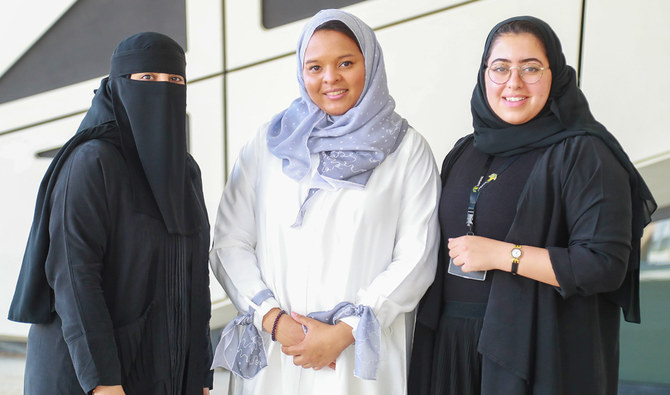RIYADH: A trio of young Saudi women have taken charge of the digital demands of the G20’s “ideas bank” by leading its content creation and social media.
Think 20 (T20), which was established in 2012, is considered the G20’s policy recommendation engagement group that is responsible for connecting and collaborating with regional and international think tanks.
Saudi Arabia holds the 2020 G20 presidency, and the T20 has led events and webinars throughout the year that address pressing issues such as cybersecurity, climate change and the coronavirus pandemic.
Lama Yaseen, Linah Alhamdan, and Nourah Alhosain were selected to handle communications for the T20, and their lack of experience in digital content creation did not prove to be a problem.
The researchers, from King Abdullah Petroleum Studies and Research Center (KAPSARC), took charge of the T20 website and social media platforms to create a link between the people working behind the scenes and the group’s global audience, as well as gaining knowledge and skills along the way.
Yaseen, who moved from Jeddah six years ago, is a research associate and software developer at KAPSARC. She is also a part-time software engineering student.
“I was really into things like human/computer interactions but, when I came here, what really caught my attention was the fact that they wanted to make KAPSARC centralized with data analytics,” she told Arab News.
She said that KAPSARC’s goal to emphasize data modeling and science was a big draw for her and helped cement her decision to stay on.
“I managed to actually connect that and still do the things that I loved, like software development. It was a blessing to be able to do research and software development at the same time.”
Alhamdan, a senior research analyst, works with KAPSARC’s Energy Information Management team as a data analyst and a web developer. She joined the team in August, at the height of preparations for the summit, to lend an extra hand.
“The communications team is considered the face of the T20, so everything depends on them being visual and, in terms of content, reaching the biggest audience possible,” Alhamdan told Arab News.
Alhosain joined KAPSARC in 2017 with a background in computer science. “I work in the policy and decision science team, and I’m also part of the GIS (geographic information system) team,” she told Arab News.
The three women teamed up to help with the technical parts of communication and social media.
Cian Mulligan, a senior research associate at the center, was communications lead.
“It’s all about having targets to work toward,” he told Arab News. “Back in November, it was about getting the T20 website up and running on time for our official start date of Dec. 1, 2019. After that, it was about promoting the Inception Conference in January. Once we handled those two things, we had the confidence that we could pull off the rest.”
Yaseen said that, because of their experience in software development, they had an eye for front-end development. “Things like developing apps, UI and UX, and we found ourselves helping out with designing graphics using the logo, combining colors, and so on. We managed to pick that up, and it was actually very fun.”
The team provides content for the website and across social media in both English and Arabic to ensure wider audience reach, a task that proved a little difficult given none of them were used to working in translation. However, as time went on, they embraced the challenges and found themselves enjoying the process.
“We wanted to listen to different opinions and have as much engagement as possible to make sure that we delivered as much as we can in terms of the content,” said Alhosain.
Mulligan said it had been a balancing act between engaging with the established T20 community, the broader G20 community, and the general public from the outset. “There are many diverse stakeholders involved within, but I found it convenient to just focus on those three broad groups and hope everyone is covered,” he added.
The team strived to ensure they were able to make all of the T20’s content available and accessible, especially with the current global pandemic restricting in-person events and seminars and with the renewed emphasis on digitalization.
“Everything is becoming more digital, and the focus is on digital content and digital channels like the website or social media platforms,” said Alhosain. “For the T20, we’re handling the website and social media so all the digital content comes through us. It’s our responsibility to deliver and show the T20 community and the world our ‘product,' or the work that the team is doing. It’s a great responsibility that we’re delivering the output, and to make sure that it’s done in the right way to the right audience at the right time. It was challenging for us but, coming from our backgrounds, it was exciting to incorporate what we’ve studied into this.”
Alhamdan said the team had noticed a lot of people joining in with T20 events from all over the world. “The topics made them interesting to a lot more people, and accessible to anyone who is interested.”
Mulligan felt he had a responsibility to give something back. “Throughout the year, and especially at the toughest times, my main motivation was the idea that at the end of this, KAPSARC – a relatively new organization – will be able to say that it – along with KFCRIS (King Faisal Center for Research and Islamic Studies) pulled off the 2020 T20. It is not often that you get to be part of a project like that.”
The T20 summit is set to take place between Oct. 31 and Nov. 1.
Key policy recommendations will be presented for the upcoming G20 Leaders’ Summit next month in Riyadh on Nov. 21-22.




























